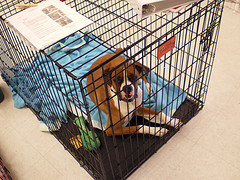Adopting a new dog is a very exciting time for you and your new friend. The biggest mistake that new dog owners make is giving the dog too much freedom, too soon. By setting some ground rules as soon as you bring your dog home, you can prevent bad behaviors from starting in the first place.

Follow some simple guidelines when you bring your new dog home, and things will go much more smoothly. (Photo Credit: Ian Phillips)
Introduce the dog to the house slowly. Giving your dog complete access to the entire house is setting yourself up for failure. The dog can easily sneak off and discover how much fun it is to steal shoes from your closet, pull tissues from the trash can in the bathroom, or pee on the rug in the spare bedroom.
Instead, use x-pens or baby gates to limit the dog’s access to most rooms of the house. Start off by giving him access to the living room, kitchen, and dining room, and then gradually add a room at a time over the course of a week or two.
Don’t make assumptions about the dog’s past. Typically, fearful behaviors point to a lack of socialization, not abuse. If your new dog is afraid of men, it’s unlikely that she was abused by one — it’s far more likely that she was raised by a woman and didn’t meet many, if any, men as a young puppy. Take it slow, and if your dog is showing significant fear, contact a dog trainer to help you develop a training plan to address those fears in a humane fashion.
If the dog was at a shelter and not in a foster home, it is possible that the dog has very little experience with life in a house or an apartment. This is very common with ex-racing greyhounds — often they do not know how to go up and down stairs and are startled by things like overhead cabinets, blowing curtains, or the whistle of the tea kettle.

A crate, sized appropriately for your new dog, will be a useful tool when you bring your new dog home. Use a crate or x-pen to temporarily confine your dog while you are too busy to supervise him. (Photo Credit: Celeste Lindell)
Treat the dog as if he is not housebroken. Even if the foster owner swears on her life that the dog you have adopted is housebroken, it is extremely common for dogs to “forget” their housebreaking in a new situation. Therefore, take your new dog out for potty breaks often. A good rule of thumb is to take the dog out every hour when he is awake.
If the dog has spent lots of time in a shelter environment and has not been fostered, expect to start from scratch when you bring him home. Crate the dog when you cannot supervise him to make sure he doesn’t find a quiet corner to do his business while you’re distracted.
It’s so much better to be pleasantly surprised by your new dog’s level of house training, rather than upset and disappointed by her accidents!
Resist the urge to bring your new dog out in public right away. Moving into a new home is often extremely stressful to an adult dog. Don’t stress the dog further by bringing him to your family cookout, your son’s baseball game, or to the dog park. Doing so may overwhelm the dog to the point of growling or snapping at something that normally would not bother him at all. I have seen dogs returned to shelters for this very reason.
Give the dog at least a week to get used to the schedule of your house and learn to trust you a bit. The only place your dog should go is to the veterinarian for a full check-up shortly after adoption. Sign up for a group training class that starts two or three weeks after your adult dog comes home. (One to two weeks of acclimation time is enough for younger pups under 5 months of age.)
In short, take it slow with your new adoption. Overwhelming her will only serve to stress her out and delay that trust. Haste makes waste! You will have plenty of time to show her the whole house or take her to a friend’s soccer game. Give your dog time to learn to trust you, and you will set yourself up for a lifetime of great experiences with her.
